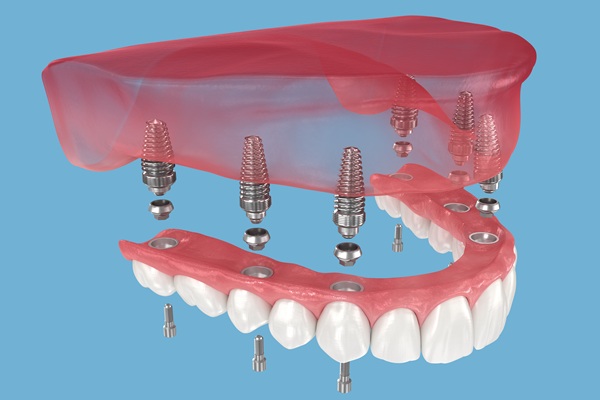Your Dental Implant Procedure: What to Expect

Every year, three million people in the U.S. undergo dental implant procedures, and the number keeps increasing yearly. Although the procedure is common, it is reasonable to be nervous about the implantation process. Dental anxiety can be serious, particularly when it involves a complex procedure. Therefore, knowing what happens during the procedure can help to allay some of your fears. This article focuses on what to expect during the dental implant procedure and all the process involved to keep you calm and prepared for the new dental implant.
What to expect
Before the implant procedure
If the dentist has recommended you for dental implants, it means you have one or more teeth missing. A dental implant is a tiny metal screw inserted into the jawbone to hold the new prosthetic tooth via an abutment. A dental implant is a more permanent dental restoration compared to dentures and bridges.
The placement procedure takes different stages. Sometimes, the steps can be completed together, but there will be a healing period between treatments. Before the implant procedure, the dentist will take x-ray scans of your teeth and gums to know their current state. At this stage, if you do not have enough bone mass for an implant, the dentist will recommend bone grafts. If applicable, tooth extractions may also happen around this time.
If you need a bone graft, the oral surgeon will need to supplement the jawbone with artificial bone or bone from other areas of your body. Based on the level of grafts required, you will need several months to heal before the dental implant procedure. In the case of minor bone grafting, the dental expert may complete the implant surgery concurrently.
The implant procedure
The placement process is the most invasive part of the implantation procedure. The oral surgeon will insert the metal that will function as the tooth root into the jawbone. Although the process is complex, the discomfort should be minimal. The oral surgeon will make a laceration in the gum to reveal the bone and create the implant hole. You will be sedated throughout the procedure, so you will not feel any of the drilling.
After inserting the implant, your jawbone will need to integrate with the implant in a process called osseointegration, and this may take several months. This is to ensure the artificial tooth has a solid grounding like the natural teeth. Before the jawbone heals completely, the dentist will place a temporary crown on the gap created. After osseointegration is complete, the implant will be ready for the new, artificial tooth.
Preparing and attaching the crown
A second appointment will be required to place the abutment, which is the piece that holds the dental crown. The procedure is not as invasive as the implantation. After placing the abutment, the dentist will take impressions of your teeth to create the new artificial crown. Depending on your condition, the dentist may suggest a fixed or removable crown.
The bottom line
To eliminate potential complications during the process, you should get your dental implant procedure done by a reputable and experienced dentist.
Request an appointment here: http://lbfamilydental.com or call Leila Zamiri DDS at (562) 453-1214 for an appointment in our Long Beach office.
Check out what others are saying about our dental services on Yelp: Dental Implants.
Recent Posts
Getting approval for dental implants is the first step in the process. Anyone interested in dental implants must undergo a consultation, examination, and assessment to be a viable candidate for the surgical process. Since an implant is surgically inserted into the jawbone, the patient needs to have sufficient bone and be free of gum disease.…
Dentists generally recommend dental implants as a natural choice for replacing missing teeth. If you play sports regularly, especially contact sports, you may be worried about continued participation after having your lost teeth replaced. This article covers what you need to know about playing sports with dental implants.Every sport has required skills, levels of fitness…
People who have been recommended to get dental implants may be wondering how to take care of them after surgery. Implants are artificial teeth held in place by metal posts positioned in the gums. They are constructed to look and function like natural teeth; thus, managing them is similar to caring for regular teeth. Once…
Your dentist will more than likely be the professional that will determine if you need dental implants. General dentists can recommend procedures, but they do not typically perform this type of surgery. There are a few different options when it comes to finding someone qualified and experienced enough to help you get the smile you’ve…


